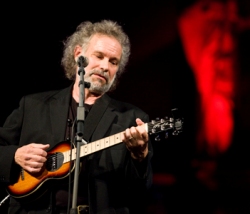 In terms of music, high standards mean trying to make the best music you can. Don't put out anything before you think it's the best you can do. Don't settle for almost good enough…
In terms of music, high standards mean trying to make the best music you can. Don't put out anything before you think it's the best you can do. Don't settle for almost good enough…
John Gorka has arrived for our pre-show interview with his entire entourage. I only see John. Now he's disappeared, and soon a roadie who looks exactly like John is loading in his gear: two guitars, a small amp, a pre-amp, and a rumpled sport coat. When you live the gypsy life, John has written, you need "high standards, low overhead, and realistic expectations."
That was your general philosophy in 2012. Is it still true?
That's still true.
What does it mean?
 In terms of music, high standards mean trying to make the best music you can. Don't put out anything before you think it's the best you can do. Don't settle for almost good enough…
In terms of music, high standards mean trying to make the best music you can. Don't put out anything before you think it's the best you can do. Don't settle for almost good enough…
The low overhead part in a musician's life means you never know where your next meal is going to come from. I've always lived below my means even when I was delivering flowers part-time and playing as much as I could at places that paid.
And realistic expectations… Have you seen that recent documentary, 20 feet from Stardom? These are supremely talented people that didn't lack for talent and didn't lack for ambition. But sometimes the world says, "No." You've got to know that the world isn't always fair. All you can do is always improve and try to reach more people at any one time.
And you also noted that people keep coming to the shows and you keep having fun.
It's more fun now than it's ever been so I'm grateful for that. I just hope I keep healthy and keep writing new songs and making recordings
And folks certainly do keep coming. It's a sellout at Steel City.
From the start, the Gorka on stage is quite different from the one in the interview. Before, he was hesitant, with speech well stocked with fillers (uh). In concert, he's familiarly self-deprecating, relaxed and spontaneous. I know too well that what seems like improvised patter is sometimes oft used on stage, but even so…
He performs without a set list. He explains, "It's presumptuous to think I know what songs to sing for an audience I haven't met yet." But, for now, folks call out names of songs and he warns, "I don't know all my songs."
He opens with "More Than One."
"More Than One" offers a slightly different philosophy of life, "a clear sky, a dry road, a full tank, a light load."
When I introduce it at shows, I say it's a song that offers the kind of advice I'd offer if I were the kind of person to take advice.
On "The Bright Side of Down," you're working once again with producer Rob Genadek.
Yes… He's a great guy, a great engineer, and a good drummer. The people he recommends are always right on the money. He's great at helping people when they need some direction and he's also good at letting them go.
Like Claudia Schmidt… I sent her the recording. She wrote me a note and sketched out a few ideas. Then, she came in and just banged out the part. Very impressive. The best oohs I ever had on a record.
She's one of my all-time favorites, one of the people who inspired me to want to do this sort of thing. She's got a great new record out, too. She sang on the "Land of the Bottom Line" record but those parts were a little quieter, so it didn't really showcase her vocals like this one does
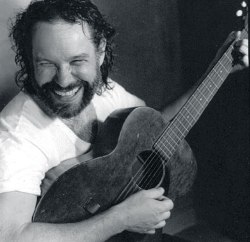 "Prom Night in Pigtown" follows, introduced as a song about "love, nutrition, and barnyard animals." Then John asks for a show of hands. "Who's seen me before?" A clear majority… "I'm John Gorka, by the way, so I'll do an introductory song." "I'm from New Jersey," follows. It has become even more widely played since Governor Christie's recent problems.
"Prom Night in Pigtown" follows, introduced as a song about "love, nutrition, and barnyard animals." Then John asks for a show of hands. "Who's seen me before?" A clear majority… "I'm John Gorka, by the way, so I'll do an introductory song." "I'm from New Jersey," follows. It has become even more widely played since Governor Christie's recent problems.
"Where No Monument Stands" comes next.
"Where No Monuments Stand," is featured in the upcoming documentary "Every War Has Two Losers." It's a poem by activist poet William Stafford. Is contemporary poetry an influence?
Not as much as I would like it to be. Recently I got a collection of Stafford's poems. They are masterful. He can really paint a whole world in a few lines. I admire poets because they can do it all, just with words alone. That's something.
Of course, poets refer to music in their poetry…
That's right. When Debussy asked permission to set one of Mallarmé's poems to music, Mallarmé responded: "But I thought I had already done that!"
Another request and John's pianist sits down at the keyboard on stage. He, too, looks exactly like John. It's another iconic song, "Houses in the Fields," inspired by development in the countryside around Bethlehem, PA, where he got started in music. Afterwards, he quips, "Is that the 'House in the Fields' you wanted?"
Back on the guitar, John explains the cut out capo he's putting on the second fret. It only covers the middle four strings. Then he tells the story of the title, "The Bright Side of Down," a phrase a friend used when discussing the attributes of goose down. For John, it becomes the title of a song about something completely different.
How does that happen, going from a phrase that strikes you to a song?
Sometimes it is something I overhear, something that moves from the language of a conversation to the language of a song. And I try to pay attention to that… I say, "Okay." I just try my best to get out of the way. And it seems to work out better that way, otherwise you can stunt a song's growth.
[Other times] it starts with a feeling or something I play on the guitar. It might even be a part I've played a million times but it's somehow different that day. So I start paying attention to the sparks of a song wherever they may come from.
I think the problem some people have with writer's block is that the song they want to write is not the song that wants to be written.
In concert, John posits that every song, "Is an act of hope."
In the liner notes for "Silence" on "Jack's Crows," you virtually apologized for writing a completely positive song…
I think there's room for those kinds of songs, but songs about harder times and marginal people have always appealed to me more than songs about successful people. I've learned more from other people's sorrowful songs than I have from the "happy days are here again" kind of song.
John introduces "Outnumbered" which he describes-only half-jokingly-as one of what must be three or four overtly positive songs he's written.
Talk about "Outnumbered."
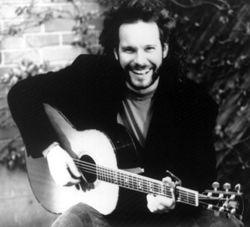 It's brief... One of the things that inspired me in the last few years were the songs of Tim Hardin. He was able to say a whole lot in two minutes. I never got to see him play, but he wrote really great songs. That's a good goal as a songwriter… to say as much as possible in as little time as possible.
It's brief... One of the things that inspired me in the last few years were the songs of Tim Hardin. He was able to say a whole lot in two minutes. I never got to see him play, but he wrote really great songs. That's a good goal as a songwriter… to say as much as possible in as little time as possible.
I used to think I had time to do the things I wanted… until I had a child.
You had stopped traveling abroad and then resumed a few years ago:
In 2008, a couple guys came over from Holland to a show at World Café Live after the "Writing in the Margins" record came out. They had seen my tour schedule and realized I wasn't going over there. So they said, "[If he's not coming here], we're just going to go see him." They picked the show in Philadelphia.
They came up to me and said, "One of us is turning fifty and one is turning sixty. We want to invite you to our one hundred and tenth birthday party." So I went over, met those guys, and I started going over there regularly. There's a real audience in Holland and I may go a few more places.
The audience calls out more requests. "I'm recognizing some of these titles. I can usually retrieve a song or two during the break." But he'll play two or three more before then, "depending on how much I talk."
He does, "I Saw a Stranger with Your Hair" then says he'll be back in ten minutes for a second set and "there will be no repeats."
He closes the set with "Thirstier Wind" from the new record. He explains that because there's such a dry wind around Minneapolis where he lives, the snow never melts until spring.
For me, "Thirstier Wind" was a bookend to "Holed Up in Mason City," [about a snowstorm). It's finally the end of a long winter ("Every spring is a victory / when the winters are this long.")
It's one of two spring songs on there.
John finishes by promising that his road manager will be out during the break. And sure enough, the road manager-who also looks exactly like John--comes out carrying boxes of CDs, most of which sell. John must need a very large trunk in his tricked out folksinger's touring vehicle.
The second set begins with "Holed Up in Mason City," the opener on the new CD.
"Holed Up in Mason City," introduces the themes of time and winter that run through the album… I wondered if you possibly could have written some of these songs during this terrible winter and then had the album ready for a March release.
It's kind of funny how it worked out that it was in sync with this long winter. I [actually] started recording it in September of 2012 and finished it around a year later.
John says he wants to get in everyone's requests "while you're still here" and launches into "Blue Chalk" from "Between 5&7" ("because it was my sixth album"). It's about some of John's friends who "made bad choices."
Next he does "Let Them In," a poem set to music by John that was recorded by David Wilcox and a cover of Townes Van Zandt's "Snow Don't Fall."
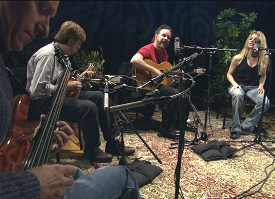 You don't often do covers.
You don't often do covers.
I do covers to honor the people who inspired me and the people that should be heard if they haven't been. A lot of these songs are older songs, like the Townes Van Zandt song. Michael Smith's "The Dutchman" is one of my favorite songs ever, it needs to be heard.
"She's That Kind of Mystery" is a highlight of the CD. Talk about Bill Morrisey.
He was just a great guy, a great artist, and a great person to be around. He was always very funny and very smart and we miss him, so I wanted him to be on this record. Yeah… it's a great song.
You're pretty faithful to Morrisey's original version, even with the female voice tracking the main vocal.
I wanted Amelia to sing on that because she was close to Bill. She couldn't come to the celebration of Bill's music we had in the Summerville Theater in 2011. She came up with multiple parts. It was nicely done.
Jack Hardy…
First met him in 1979. Russ Rentler and I opened for him at the Godfrey Daniels Coffeehouse as the Razzi-Dazzi Brothers, a sub-group of the Razzi-Dazzi Spasm Band.
At the Godfrey Daniel, I would read about the people that were coming there and sometimes they'd let me open for the ones who seemed interesting, mostly the singers/songwriters.
And Jack came in and most of what he performed that night had been written in the previous eighteen months or so. He kept himself on the schedule where he'd write a song every week. I knew that novelists would sit down every day and write a chapter a day or a certain number of words. I didn't know that songwriters could do that; I thought they waited for the inspiration to strike. But Jack said, "No, that's a copout. If you work at it you'll be kind of exercising the writing muscles. Even if you throw out three quarters of what you do, you'll get better faster by working at it."
And that was very inspiring to me and I decided I'd try it. Maybe I couldn't do a song a week, but I could do a song a month. So, the first year I set a goal to write a song a month and I ended up with more songs than months. The next year I said I'd go to two songs a month. I tried to keep on that for many years… That's before having kids.
(Jack) and Christine Lavin were the real forces behind the Fast Folk scene at the Speakeasy in Greenwich Village. Christine was like the cheerleader, the social director who brought everyone together. Jack was a very charismatic guy but also a polarizing one, so between the two they were able to gather a lot of good people together.
"Now," he says, "I'm going to play little guitar for you," and pulls out his diminutive G# guitar… "I'm going to play an old blues song… that I wrote myself from the time of the decline of Bethlehem Steel. Bethlehem was trying to re-vitalize itself and pricing other folks out" and plays "Where the Bottle Breaks" and then the traditional, "Wayfaring Stranger." The G# guitar has a shimmer that gives me shivers, but it also has an eerie subtext.
You listed as a first on your website that you had "traveled with the G# guitar…"
It's tuned standard as if it were capoed on the fourth fret. I played it during the session. Not sure if any of that remains [in the final mix.]
…and a tube amp, a 1970 Fender Bronco."
 That's like a Vibro Champ but it's rebranded… Came in a package deal: the Fender Bronco guitar came with a Fender Bronco amp, 6 watts.
That's like a Vibro Champ but it's rebranded… Came in a package deal: the Fender Bronco guitar came with a Fender Bronco amp, 6 watts.
I've seen the new record described as "warm" and I think that is very apt. One element of that to me was the sound of the high strung guitars.
There's high strung on three tracks. The only time I played a high strung guitar before was on the Dylan tribute, "A Nod to Bob" on "Girl from the North Country."
You also did "Love Minus Zero/No Limit" on "A Tribute to Bob Dylan."
I'd forgotten about that one. I was terribly sick. They set up two microphones in a stereo pair. I don't know how it came out. I don't think I ever listened to it. I like Dylan but I liked Tim Hardin and Eric Andersen better.
What do you play on stage?
A Martin OM-28VR and the G#.
Do you use any tunings?
Sometimes I play in Drop D, and I sometimes play with a cutout capo.
On "Bright Side of Down," 8 of 12 tracks begin with acoustic guitar.
The last record and this one were built around the vocal and the acoustic guitar performances. Sometimes when I play with other people it's fine and it adds to the whole musical picture but sometimes it changes things, subtleties get moved around a little bit or disappear.
I think since most of the time I play by myself, I wanted the record to reflect what people would hear if they came to see me live.
Someone calls out for a singalong. John responds, "All the songs I've done were singalongs." …goes into "When I Grow Up to Be a Tree," and afterwards warns the audience he's going to share every song that comes into his head. And then another new track, playing the guitar figure from the album…
"Really Spring…" Your side won… but in the end you're on your knees with the loser, winter?
It just knocked me down.
It opens with a lovely overlay of guitars.
That's me playing acoustic and Dirk's playing the high strung part. I think there's an electric part. And then there's Antje [Duvekot].
And a lovely overlay of Antje voices it is.
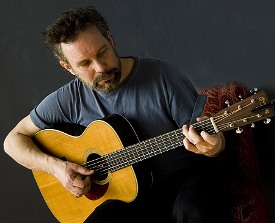 John plays "People My Age" for an audience largely made up of folks who fit that description, so afterwards he adds, "If I made eye-contact with anyone in the audience, it was purely accidental."
John plays "People My Age" for an audience largely made up of folks who fit that description, so afterwards he adds, "If I made eye-contact with anyone in the audience, it was purely accidental."
You put out three great albums in the three years from 1990 to 1991 "Land of the Bottom Line," "Jack's Crows," and "Temporary Road." That's high quality output in a short time. Now it's been five years since your last album of new material.
What's tricky now is that I spend my time [performing] and there's so many songs I'd like to get to play and so many the audience wants to hear and two hours is not enough time. It's hard to get in all the songs I'd like to do.
To make a new record, the songs have to be, in some way better than the best of what I've already done, which is a difficult thing to do… or at least there has to be some way [the new songs] all go together.
I don't feel like I have to put out an album every year, I just want to do justice to the songs as they come and also to the songs that I've written. Many of them I haven't played out all that much. It's trickier after you've been doing it for a while.
The vocal attack on the new release is easy going. What do you have to say about this softer, gentler approach?
I used a different microphone and pre-amp combination, so maybe it's got something to do with that. I used an old Neumann U87 with a Focusrite Red preamp. I recorded some at home and some in the studio in Minneapolis. So I'd go back and forth. I'd just bring the microphone and the hard drive and have the mic pre stay the same. I'd just go in a little at a time. I'd try to get a good performance of one song and then I'd start to add parts to it. The main thing was to get a good vocal and guitar performance.
"High Horse" is written in the voice of a character, the only one on this record…
I think of that as taking place maybe on the south side of Bethlehem. I don't remember too much about writing the song, but I just wanted it to tell a story and have it be as real as possible. It could still be me saying those words.
"Don't Judge a Life" is another one about the passage of time.
There are a number of people that applies to, but I was first thinking of Bill Morrisey…
In terms of the ones who went before?
Yeah… I started that right after we'd had a song workshop for Jack Hardy with people doing his songs. That was a Friday, and Saturday night I think, I got a call from Cliff Eberhardt that Bill had died. So he's in there, and a number of others.
I think nobody goes out with much grace in this life.
How about "Honeybee"? It's probably the most hummable tune on the album, but… a John Gorka kids' song?
 I hadn't thought about recording that at all. It was a song I'd sung around the house for my daughter when she was little. So, my wife said, "You've got a song or two that mention your son. You've got to get one in there for your daughter to equal things out a bit."
I hadn't thought about recording that at all. It was a song I'd sung around the house for my daughter when she was little. So, my wife said, "You've got a song or two that mention your son. You've got to get one in there for your daughter to equal things out a bit."
So I recorded that at the end of the session. I just went in and did it. That wasn't the first take. That was the only take. Then I sang some back-up parts and humming parts.
Claudia Schmidt provides the most revelatory guest vocals on the CD in "Procrastination Blues." She's got pipes. Was her vocalese part at the end spontaneous?
We had left this long outro, knowing something was going to go there. I thought about Claudia because she's so musical. And she just came through. I was hoping for something good and she was more amazing than I expected.
"Mind to Think…"
This was from a session in 1995 at Paisley Park. The only part we kept was Michael Manring's bass. Everything else was re-done.
From the first note, it's unmistakably Michael Manring on bass. You were both with Windham Hill…
There [had been] a fretless bass on "Land of the Bottom Line" and Will Ackerman recommended Michael. "Jack's Crows" was the first time we worked together. And that was the first time I recorded live with the other people playing. I loved that. The whole thing was done in about ten days where the others had taken a couple years. The first two records were kind of painstaking because I was getting introduced to the recording process with Bill Kollar. We did the vocal and guitar separately to a click track, which is a difficult thing.
This track's got you on banjo.
That's funny… The mixing on this album didn't take very much time at all because it was essentially done. There weren't a lot of parts. So, I went out to get some food and when I came back Rob played me a mix of that and I said, "What's that in there, banjo?" That hadn't been included in the mix for months. I'd forgotten I'd put a banjo part on there. It was just back porch sounding enough that it works really nicely with the mandolin and the fiddle .
The All Music website offers a list of words about you, I think its readers contributed. The top words were: acerbic, bittersweet, brooding, literate, melancholy, organic, somber. What do you think?
That's a little darker than I would have wanted. I could see if they listened only to the recordings. At least some of them sound like a sadder guy than I am.
This year is the 25th anniversary of your first record, "I Know."
It doesn't feel like that long ago.
John closes the show with "The Gypsy Life," (with an encore of "Love is Our Cross to Bear") explaining that "people love you when they know you're leaving soon." He says he'll go down stairs for a minute "so the people who don't want to meet" him have a chance to get away first. And he does just as he promised, graciously staying as long as there's someone to talk to or a question to answer, his own press secretary. Then he'll become his own roadie, and his own driver, and his own road manager and go on to the next gig in his car.
John Gorka has managed the Gypsy life for more than a quarter of a century, and it hasn't gotten one bit more glamorous, even for an artist dubbed, "The preeminent male singer-songwriter of the new folk movement" by "Rolling Stone Magazine."
Last question… in your top ten for 2012, you noted--first on the list--that, "The world did not end on December 21. " Were you prepared to adjust, just in case it did?
I think I would have, yes.